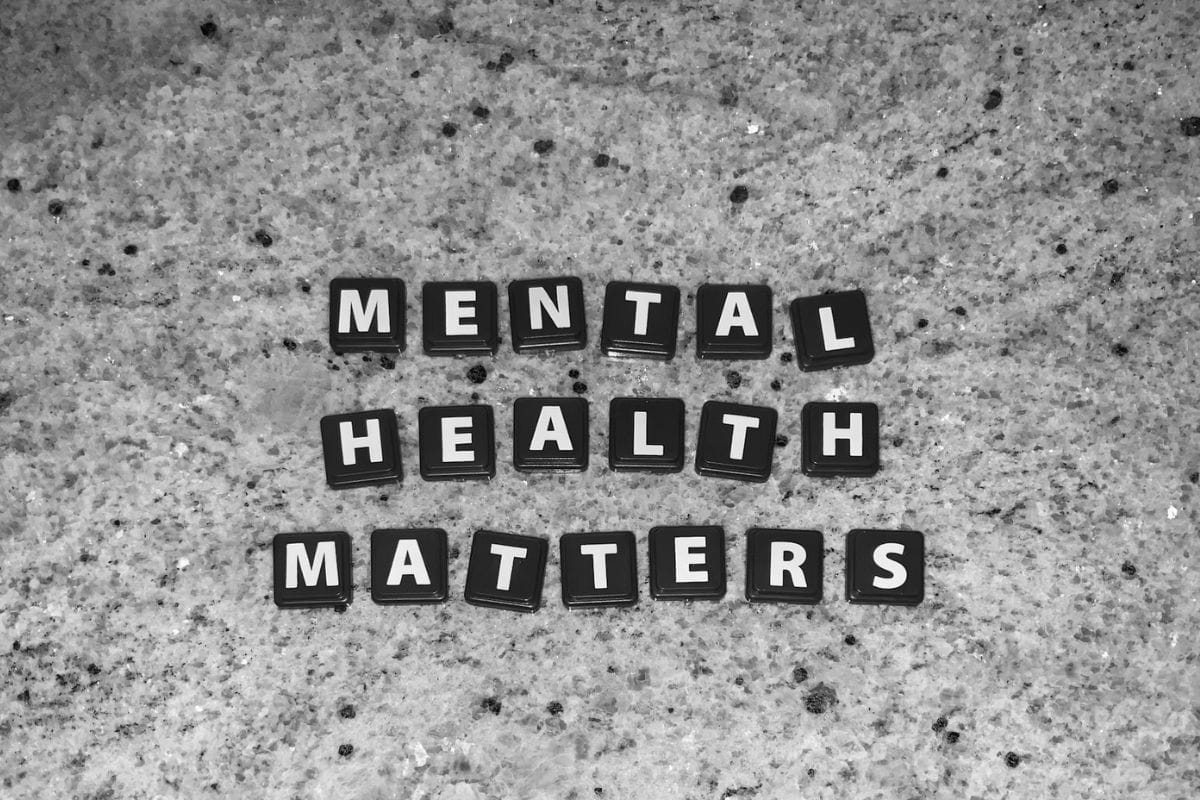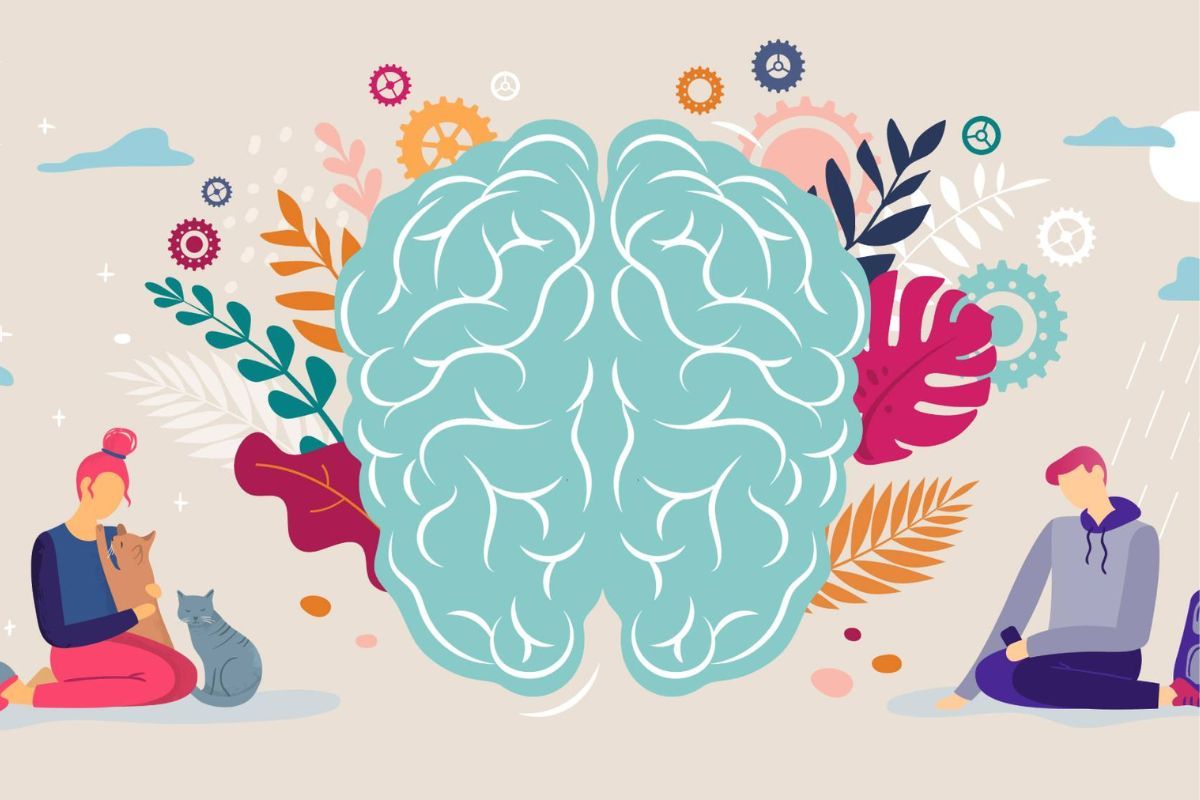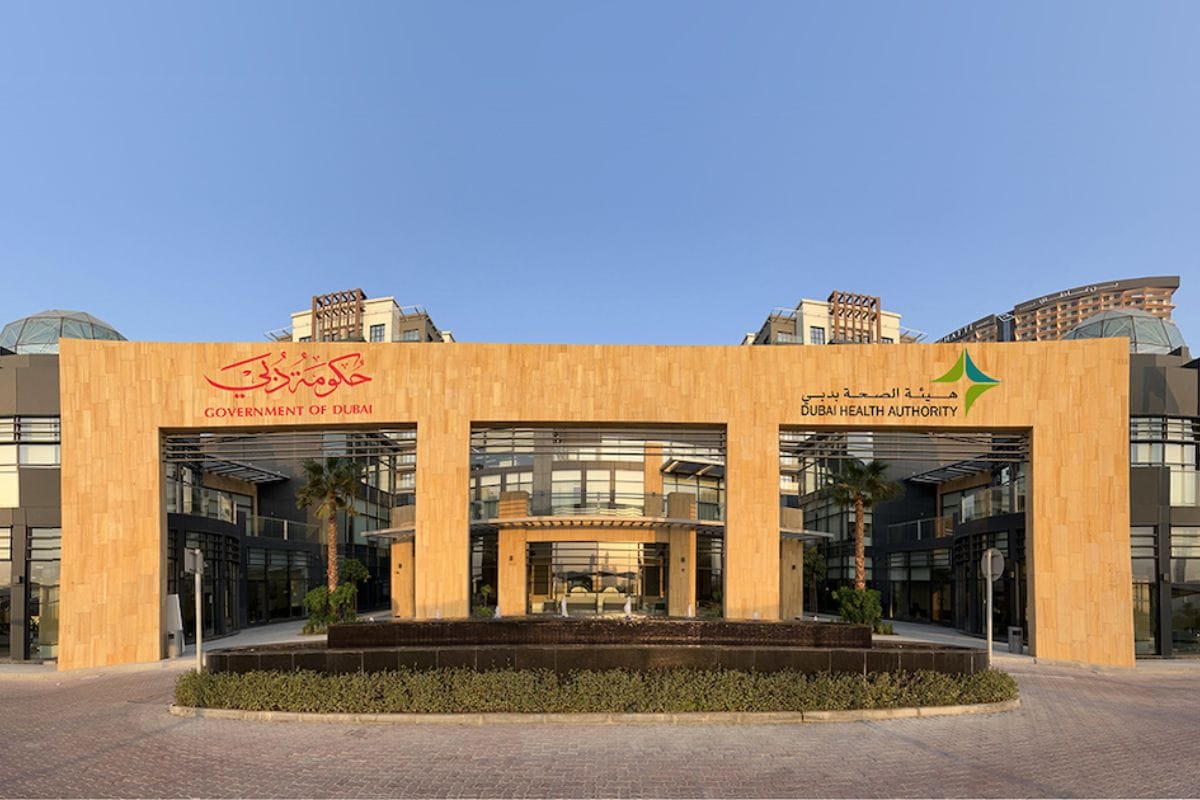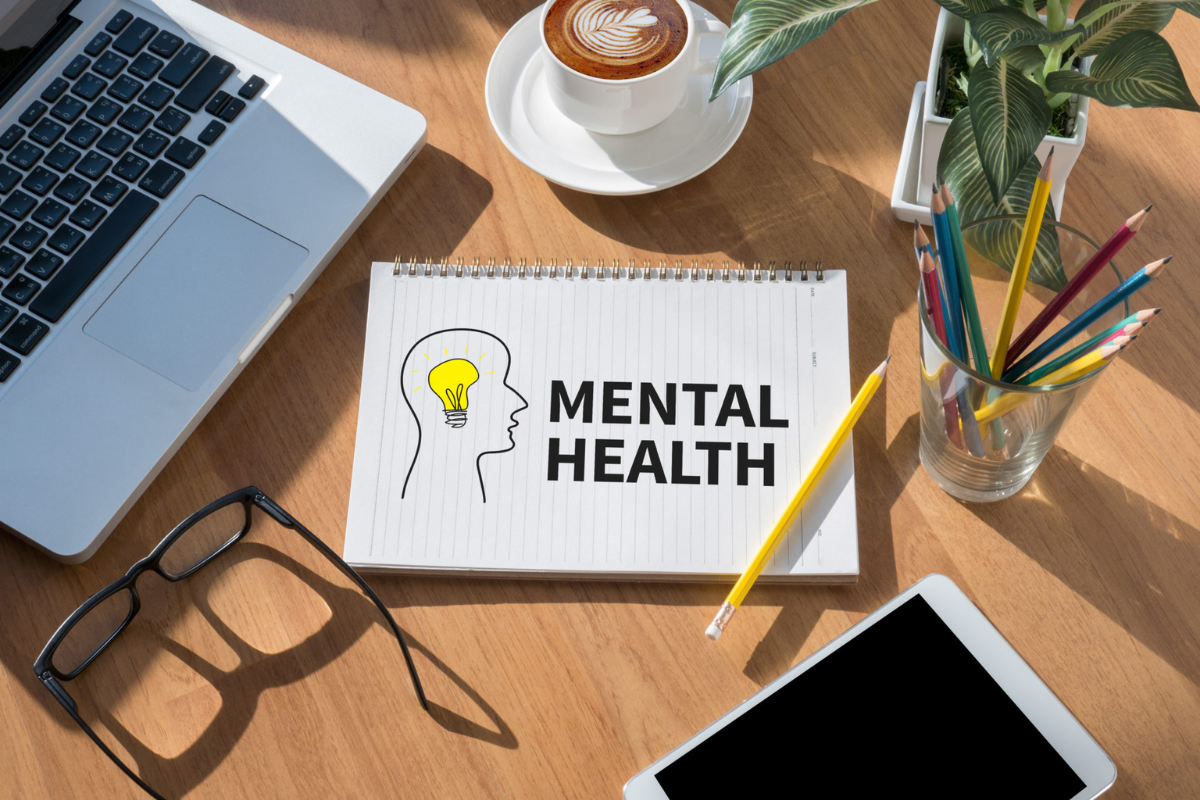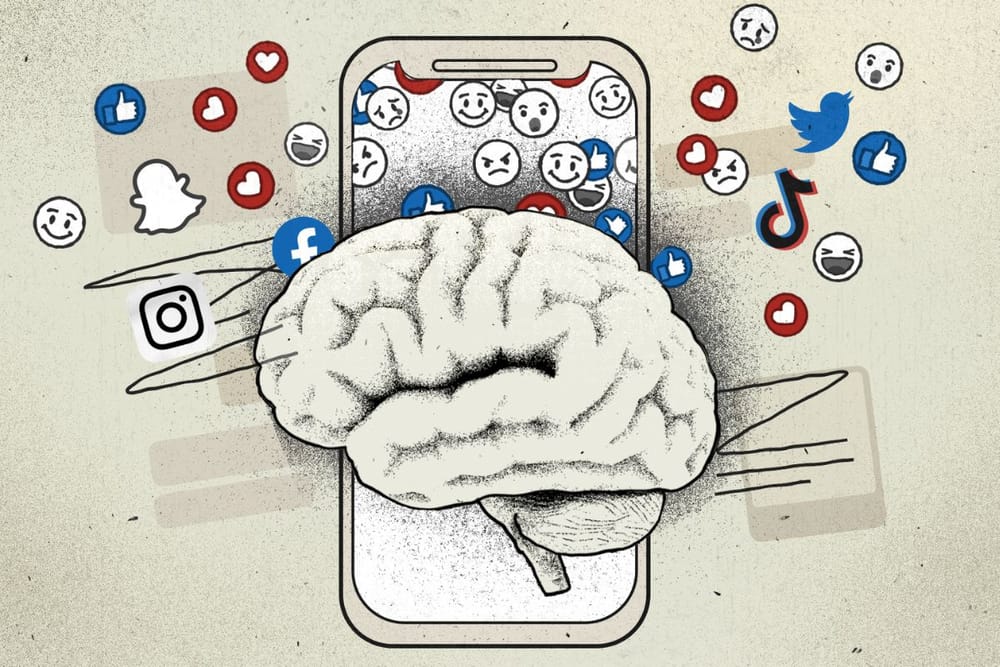The emergence of social media has fundamentally transformed how we communicate with one another. With the simple touch of a button, we have access to other people at all times of the day. Platforms like Instagram, Facebook, TikTok, and Twitter have become integral to our daily routines, enabling us to interact with family members and friends, accept invitations to public events, and join online communities that align with our interests.
Since the early 2000s, social media has opened a new avenue for social experiences, extending the possibilities for communication beyond geographical boundaries. These platforms allow us to stay connected, share experiences, and access information instantly. However, alongside these benefits, social media also has significant effects on our mental well-being.
In this article, we will explore how social media influences our mental health.
How Does Social Media Affect Mental Health?
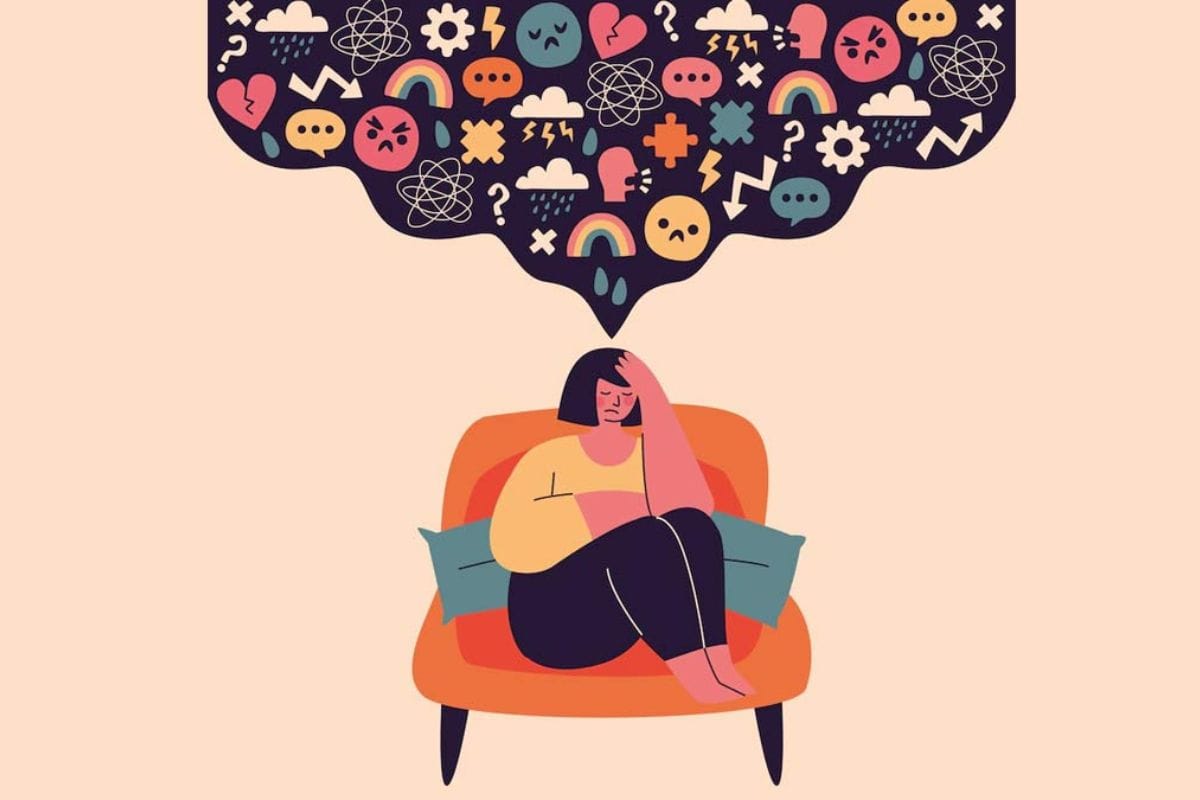
Human beings are inherently social creatures. Our need for companionship and social interaction is deeply rooted in our biology, and the strength of our connections profoundly impacts our mental health and happiness. Being socially connected to others can ease stress, anxiety, and depression, boost self-worth, provide comfort and joy, prevent loneliness, and even add years to your life. Conversely, a lack of strong social connections can pose significant risks to your mental and emotional health.
In today’s digital age, many of us rely on social media platforms such as Facebook, X (formerly Twitter), Snapchat, YouTube, TikTok, and Instagram to find and connect with each other. While these platforms offer numerous benefits, it is crucial to remember that social media can never fully replace real-world human connection. In-person contact triggers the release of hormones that alleviate stress and enhance feelings of happiness, health, and positivity. Ironically, despite being designed to bring people closer together, excessive engagement with social media can make individuals feel lonelier and more isolated, exacerbating mental health problems such as anxiety and depression.
If you find that excessive social media use is leading to feelings of sadness, dissatisfaction, frustration, or loneliness, it may be time to reassess your online habits and strive for a healthier balance.
Pros and Cons of Social Media
Social media is a significant part of our society, offering many benefits but also presenting some drawbacks. Here's a detailed look at both:
Advantages of Social Media
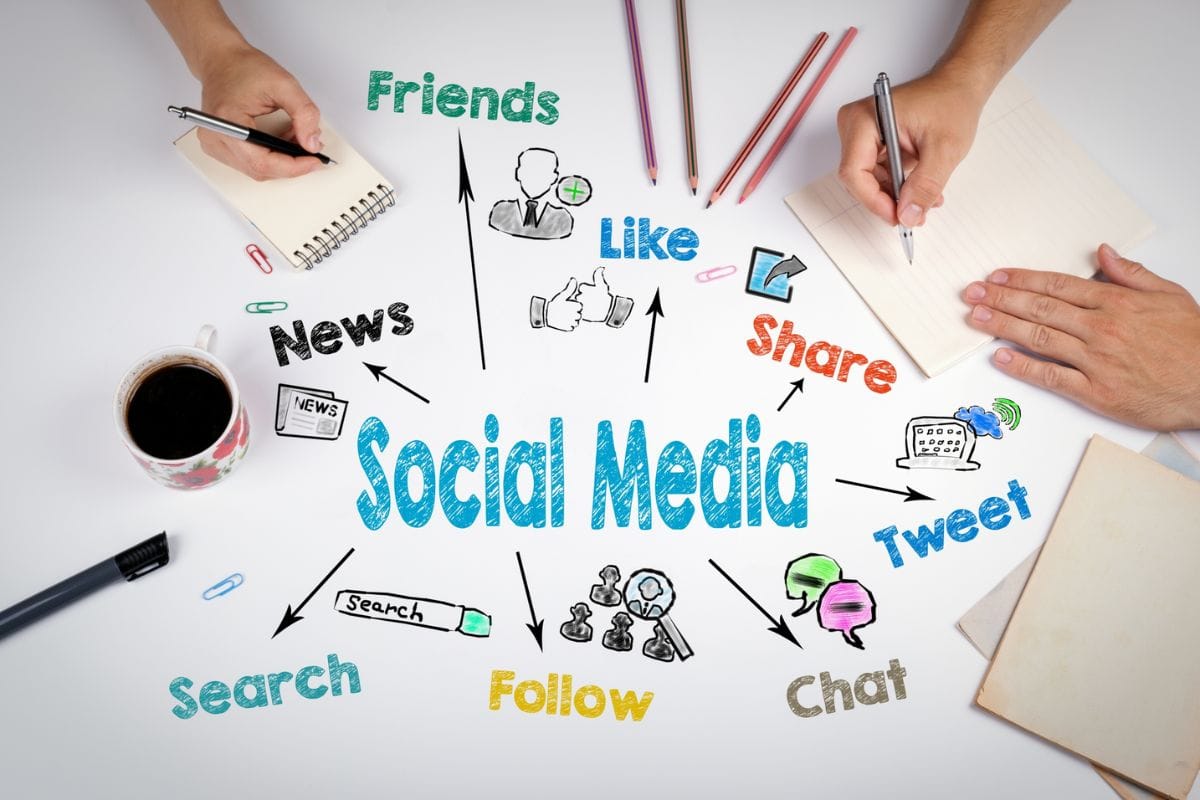
- Connectivity:
Social media bridges geographical gaps, enabling people to stay in touch with friends and family no matter where they are in the world. It allows for real-time communication and the sharing of life events, strengthening relationships that might otherwise fade due to distance. - Awareness:
Social media platforms raise awareness about various social issues, including mental health, environmental concerns, and political activism. Users can share information, participate in discussions, and mobilize support for causes, fostering a more informed and engaged community. - Creativity and Self-Expression:
Social media provides a platform for users to express themselves creatively, whether through writing, photography, music, or other forms of art. This expression can lead to new connections with others who share similar interests and offer a therapeutic outlet for emotions and ideas. - Access to Information:
Social media serves as a vast repository of knowledge, where users can join groups and forums to learn about topics of interest. This access to information enables users to seek advice, share experiences, and gain insights from diverse perspectives. - Emotional Support:
Many individuals turn to social media for emotional support, joining online support groups or reaching out to friends and family. This support network can be crucial during difficult times, providing comfort and understanding from others who have experienced similar challenges.
Disadvantages of Social Media
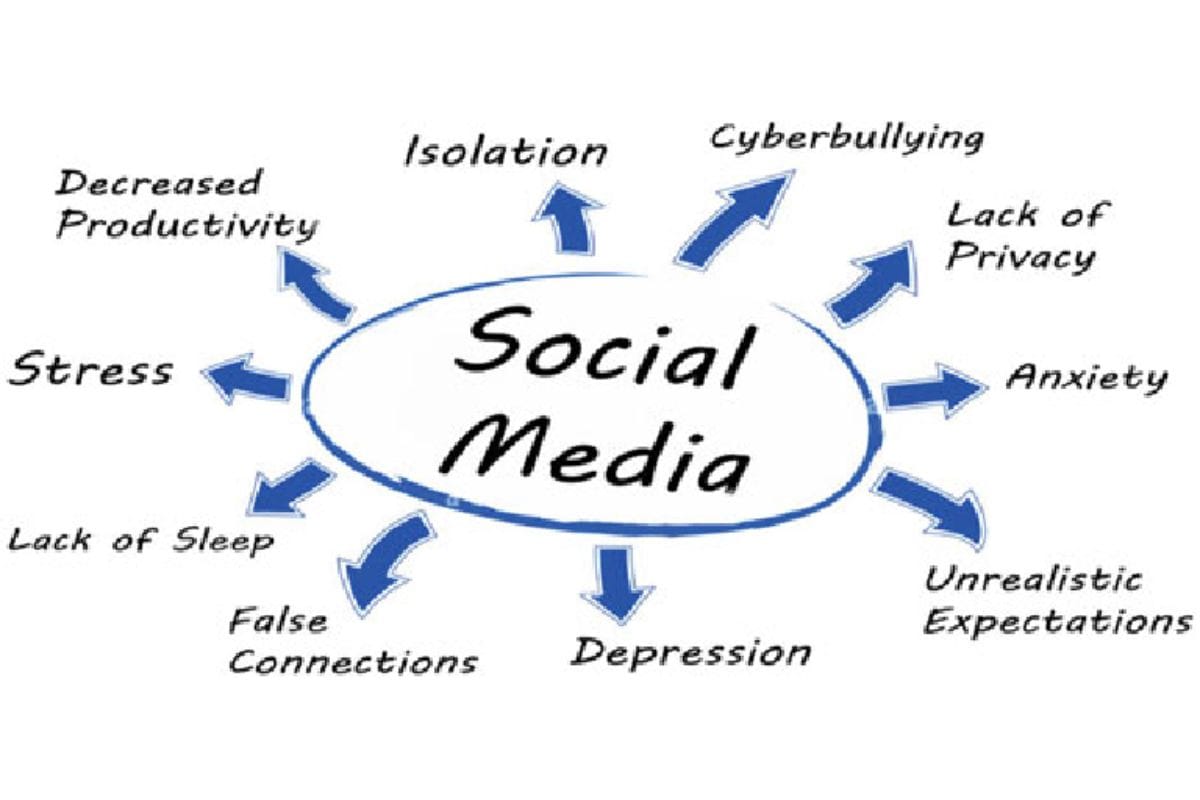
- Mental Health Issues:
Frequent use of social media can increase feelings of loneliness and isolation, contributing to mental health problems such as anxiety and depression. The constant comparison to others' seemingly perfect lives can lead to feelings of inadequacy and low self-esteem. - Antisocial Behavior:
Excessive social media use can reduce face-to-face interactions, fostering antisocial behavior. As users spend more time online, they may neglect real-world relationships, leading to increased feelings of loneliness and isolation. - Misinformation:
Social media is prone to the spread of misinformation, where incorrect or misleading information can be shared widely and quickly. This misinformation can be harmless or dangerous, depending on the topic, and can lead to confusion and misguided beliefs. - Cyberbullying:
Online harassment is a significant issue on social media, with platforms providing anonymity that can embolden bullies. Victims of cyberbullying can experience severe emotional distress, leading to long-term mental health issues. - Division:
Social media can contribute to societal division by creating echo chambers where users are exposed only to information and opinions that reinforce their existing beliefs. This polarization can lead to increased tension and conflict both online and offline.
What’s Driving Your Social Media Use?
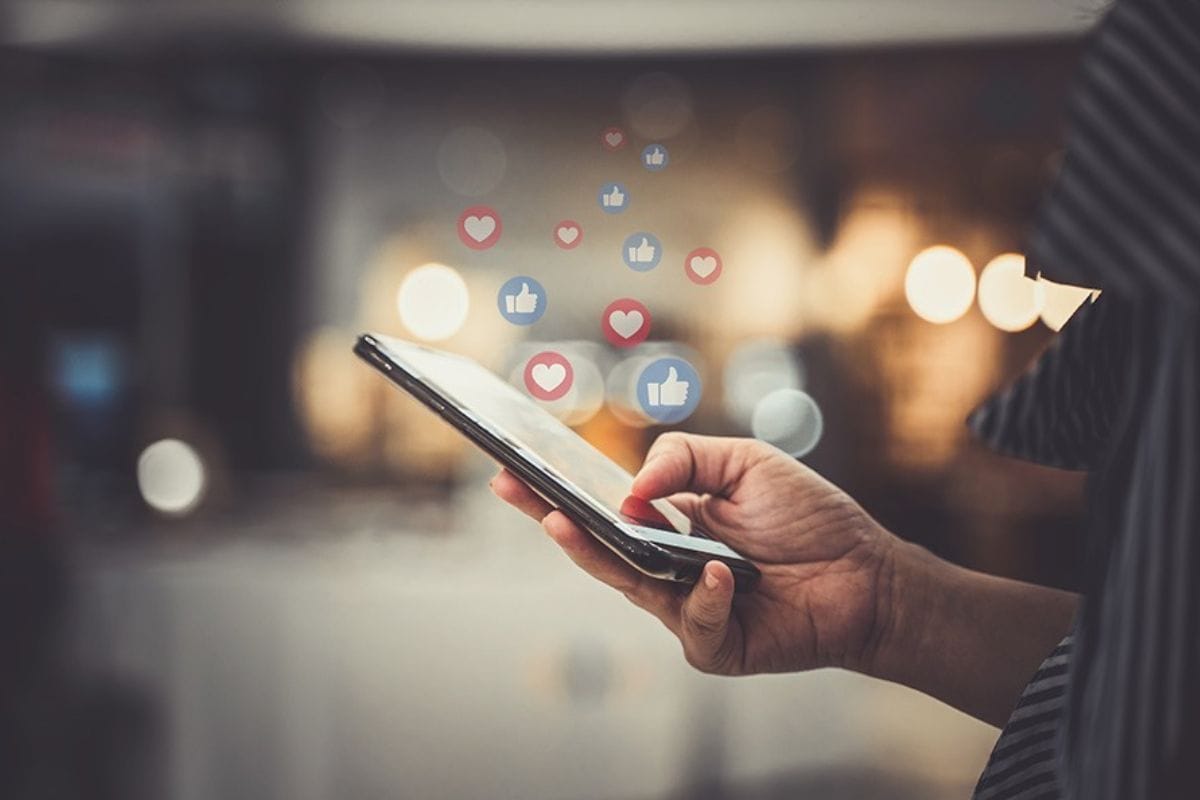
- The constant accessibility of social media via smartphones and tablets makes it convenient to stay connected, but it also means that these platforms are always within reach, leading to potential overuse.
- The round-the-clock connectivity can trigger impulse control problems, making it difficult to resist the urge to check notifications and updates frequently.
- Constant alerts and notifications from social media can disrupt your concentration and focus, making it hard to stay engaged in other activities.
- The need to stay connected can disturb your sleep patterns, especially if you use social media late at night or keep your phone nearby while sleeping.
- Social media platforms are designed to capture and retain your attention, encouraging you to spend more time online and repeatedly check your screen for updates.
- Much like gambling or substance addiction, social media use can create psychological cravings. Positive interactions, like receiving likes or shares, trigger the release of dopamine in the brain, reinforcing the behaviour and making you crave more.
- FOMO (Fear of Missing Out) drives people to frequently return to social media, fearing they will miss out on important updates, events, or conversations.
- Many people use social media as a security blanket in social situations, turning to their phones when feeling anxious, awkward, or lonely.
- Heavy social media use can be a way to mask underlying problems such as stress, depression, or boredom. It can serve as a distraction from unpleasant feelings or as a means to self-soothe.
Signs that social media is Impacting Your Mental Health
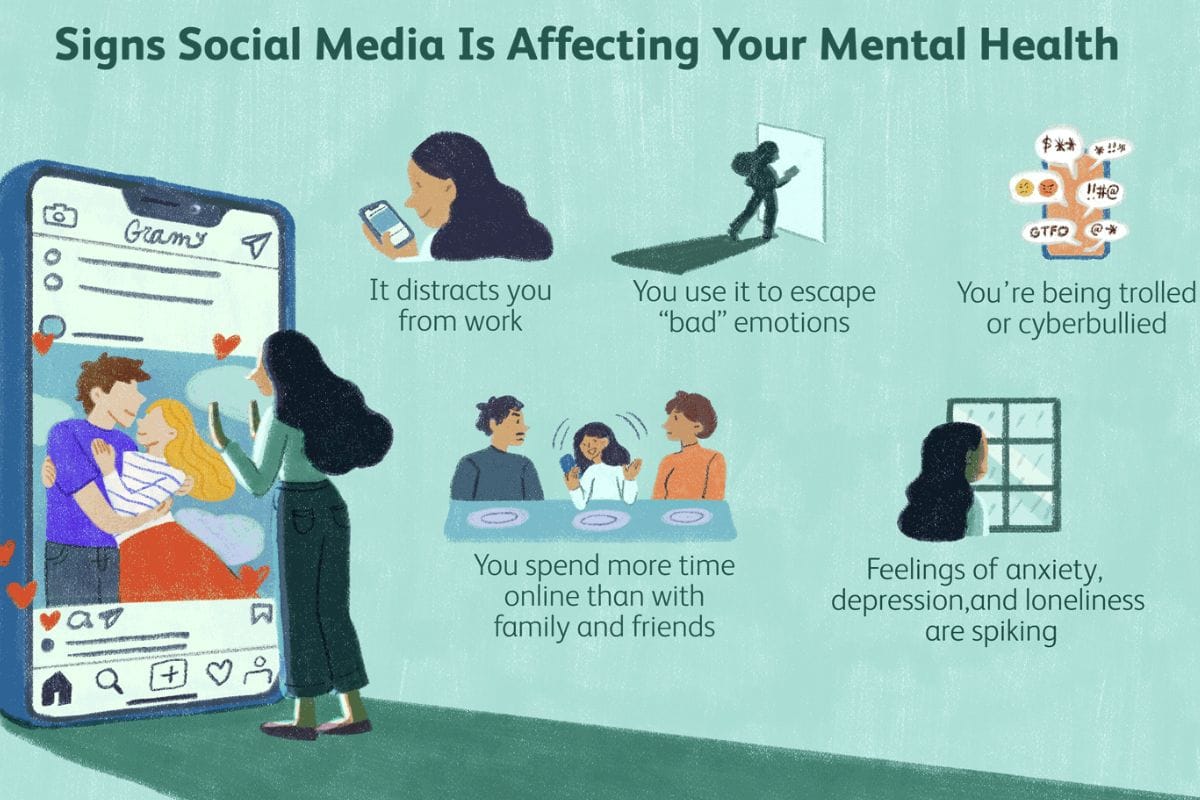
- If you find yourself spending more time on social media than engaging with friends and family in person, it could indicate a problem.
- Frequent social media use can distract you from work or school responsibilities, reducing your productivity and focus.
- If you feel envious, angry, or depressed after using social media, it’s a sign that it might be impacting your mental health.
- Turning to social media just because you’re bored or lonely, or using it to post content intended to make others jealous, are unhealthy motivations.
- Social media should not replace real-life social interactions. If it has become a substitute for offline socializing, it might be affecting your mental health.
- Constantly comparing yourself unfavourably to others on social media can lead to low self-esteem and negative body image.
- If you are experiencing harassment or bullying online, it can have severe effects on your mental health.
- Feeling pressure to regularly post content and get likes or comments can create anxiety and stress.
- Constant engagement with social media can leave little time for self-reflection, which is crucial for personal growth.
- If you find yourself engaging in risky behaviour to gain likes or shares, it’s a clear sign that social media use is problematic.
- Checking social media late at night or first thing in the morning can disrupt your sleep and negatively impact your mental health.
- If social media use leaves you feeling more anxious, depressed, or lonely, it’s time to reassess your habits.
Ways to Protect Your Mental Health from Social Media
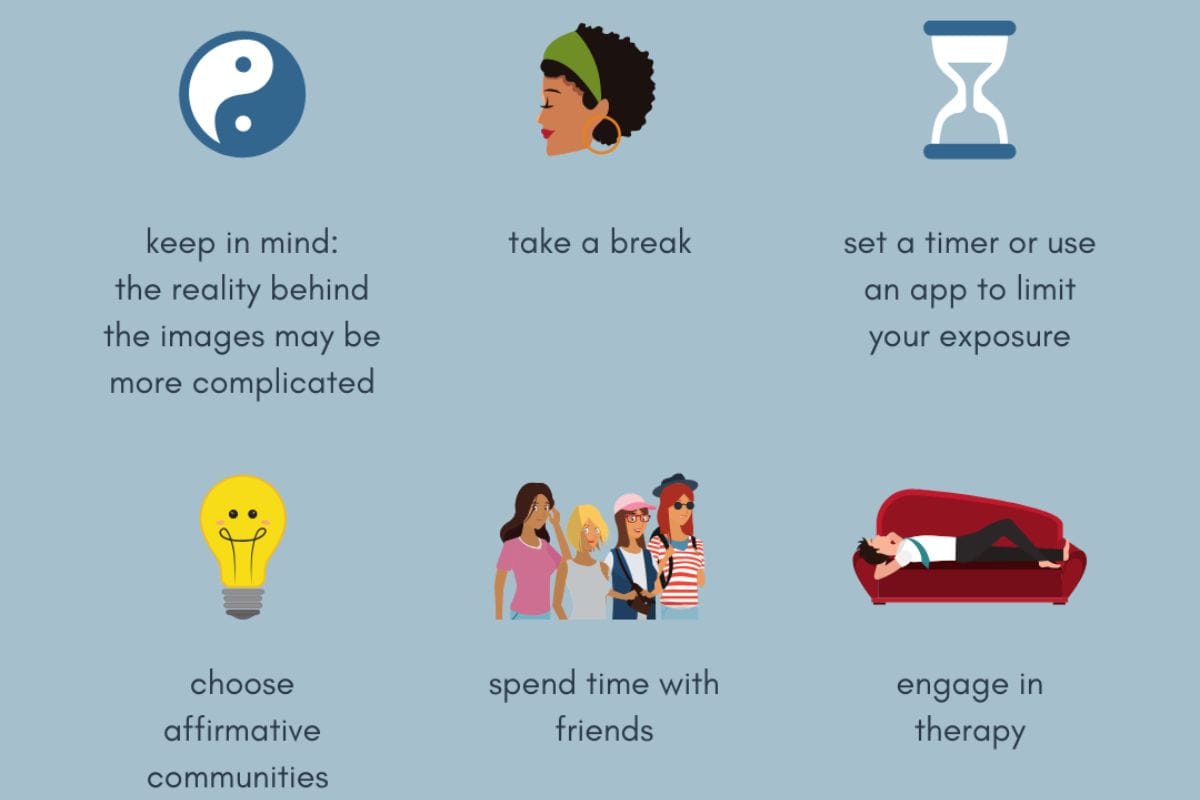
- Limit Usage:
Set a reasonable daily limit for social media use to ensure it doesn’t interfere with your real-life interactions and responsibilities. - Create Detox Periods:
Regularly take breaks from social media to disconnect and recharge. Start with limiting your usage to 10-20 minutes a day before taking longer breaks. - Turn Off Notifications:
Disable social media notifications to reduce distractions and help you focus on other activities. - Mindful Usage:
Be mindful of why you are using social media. Reflect on whether you are logging on out of habit or for a specific purpose. - Prune Your Accounts:
Unfollow or mute accounts that make you feel negative about yourself, and curate your feed to include positive and inspiring content. - Keep Tabs on Feelings:
Pay attention to how social media makes you feel. If you notice negative emotions after using it, consider adjusting your usage. - Engage Positively:
Use social media to connect with others positively, share uplifting messages, and seek support when needed. - Seek Emotional Support Offline:
Prioritize face-to-face interactions with friends and family for emotional support. - Find Fulfillment Outside Social Media:
Engage in activities that bring you joy and fulfilment outside of social media, such as hobbies, exercise, or spending time in nature. - Set Boundaries:
Establish boundaries for social media use, such as no-phone zones or times, to ensure it doesn’t interfere with important aspects of your life.
Social media is a powerful tool that has transformed how we connect and communicate. While it offers numerous benefits, it's essential to be mindful of its potential negative impacts on mental health. By using social media wisely and in moderation, we can maximize its positive effects and minimize its downsides.
Remember, taking control of your social media habits is an important step towards maintaining a healthy mind and fostering genuine connections.
Also Read:

